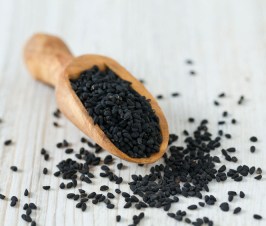Dr. Kimberly Sanders, ND
@_drkimsanders
What is Epstein Barr Virus?
Epstein Barr Virus (EBV) is a type of herpes virus that causes infectious mononucleosis, also known as “mono.” While the symptoms of infectious mononucleosis will resolve over time, the virus stays dormant inside a patients B lymphocyte cells for life. EBV inside the B lymphocytes can become reactivated during times of other infections, or possibly, during times of immune depletion or stress.1 Due to EBV’s effects on B lymphocytes, EBV may have a role in the etiology of autoimmune disease in those who are genetically predisposed.
What is Hashimoto’s Thyroid Disease?
Hashimoto’s thyroid disease is one of the most common autoimmune diseases currently and is the most common cause of hypothyroidism. The symptoms of Hashimoto’s thyroiditis, including fatigue, weight gain, dry skin, constipation, heavy menses, joint pain, hair loss and other nondescript symptoms. The diagnosis of Hashimoto’s can be made by the presence of anti-thyroglobulin and anti-thyroid peroxidase antibodies on laboratory analysis. Elevated TSH and low thyroid hormones may also be found if the autoimmune damage to the thyroid has reduced the thyroid’s ability to create thyroid hormone.
What is the connection between EBV and Hashimoto’s?
A number of studies have correlated EBV exposure to the presence of autoimmune thyroid disease.2,3,4 These studies explain that proteins from EBV, along with other viruses, are more often found in the thyroid gland of patients with Hashimoto’s than in other patients. One article explains that autoimmune thyroid disease may begin with the presence of a latent EBV infection within the follicular cells of the thyroid gland, leading to the production of inflammatory cytokines. This may lead to the presence of even more immune cells within the thyroid.5 One article explains another theory where EBV infected B cells are not kept under control due to dysfunctional immunity, leading to EBV infection in the target organ and an infiltrating of immune cells into the organ.6
How can latent EBV be treated?
While the reason for EBV reactivation is not quite understood, it seems that controlling exposure to other infections keeps EBV latent within the B cells. One can prevent infections by regular handwashing and avoiding contact with those who are ill. Secondly, managing stress may help to prevent reactivation. Some tips for managing stress include regular exercise, adequate sleep, ensuring adequate daily downtime, eating regular meals, getting acupuncture and massage treatments, and setting achievable goals for yourself. Exercise should be performed for 30 minutes at least three times per week, and one should aim to sleep for 7-8 hours a night between the hours of 10 P.M. to 6 A.M. Relaxing and maximizing downtime during the work-week is especially important to manage stress, and one should aim to take short breaks every hour. Keeping the blood sugar regulated is another method for stress management. This includes eating snacks that are rich in protein and healthy fats every few hours in order to avoid blood sugar fluctuations, as well as avoiding simple sugars and high-carbohydrate meals.
Next, keeping the immune system healthy is an important goal so as not to allow EBV infection and recruitment of immune cells into the thyroid. One study recognizes the role of vitamin D for supporting healthy immune function for this purpose.7 Reducing simple sugar intake and achieving some of the lifestyle goals mentioned above may also help to keep the immune system strong.
Antiviral botanicals and nutrients may be considered if active EBV infection is suspected. Epigallocatechin-3-gallate, also known as EGCG, isolated from green tea helps to stop EBV infection in vitro.8 Extract from Glycyrrhiza glabra may also have some effect against EBV, though benefit in humans has not been well-studied.9 High dose intravenous vitamin C has been demonstrated to have positive effects against EBV infection in humans.10 Extracts of the botanical Andrographis paniculata may also have some inhibition on EBV.11 Anti-inflammatory supplements, such as curcumin, bromelain, and fish oil, may also be considered to help mediate the inflammatory cascade within the thyroid that is caused by EBV infection, as well.
 Kimberly M. Sanders, ND, is a licensed naturopathic physician in Connecticut. She graduated from the University of Bridgeport and completed her CNME-accredited residency training there, as well. She was named 3-time MVP of the ZRT Cup Competition as a medical student. Dr Sanders currently owns ArthroWell Naturopathic, a specialty practice in rheumatology. She has undergone extensive pediatric and rheumatology training, and has lectured on the topic of autoimmunity and autism at the annual CNPA and NHAND conferences. Her passion in practice is finding the underlying cause of immune dysfunction and restoring balance to the immune system with functional medicine.
Kimberly M. Sanders, ND, is a licensed naturopathic physician in Connecticut. She graduated from the University of Bridgeport and completed her CNME-accredited residency training there, as well. She was named 3-time MVP of the ZRT Cup Competition as a medical student. Dr Sanders currently owns ArthroWell Naturopathic, a specialty practice in rheumatology. She has undergone extensive pediatric and rheumatology training, and has lectured on the topic of autoimmunity and autism at the annual CNPA and NHAND conferences. Her passion in practice is finding the underlying cause of immune dysfunction and restoring balance to the immune system with functional medicine.
References:
- Odumade OA, Hogquist KA, Balfour HH. Progress and problems in understanding and managing primary Epstein-Barr virus infections. Clin Microbiol Rev. 2011;24(1):193-209.
- Janegova A, Janega P, Rychly B, Kuracinova K, Babal P. The role of Epstein-Barr virus infection in the development of autoimmune thyroid diseases. Endokrynol Pol. 2015;66(2):132-6.
- Desailloud R, Hober D. Viruses and thyroiditis: an update. Virol J. 2009;6:5.
- Kannangai R, Sachithanandham J, Kandathil AJ, et al. Immune responses to Epstein-Barr virus in individuals with systemic and organ specific autoimmune disorders. Indian J Med Microbiol. 2010;28(2):120-3.
- Janegova A, Janega P, Rychly B, Kuracinova K, Babal P. The role of Epstein-Barr virus infection in the development of autoimmune thyroid diseases. Endokrynol Pol. 2015;66(2):132-6.
- Pender MP. CD8+ T-Cell Deficiency, Epstein-Barr Virus Infection, Vitamin D Deficiency, and Steps to Autoimmunity: A Unifying Hypothesis. Autoimmune Dis. 2012;2012:189-96.
- Pender MP. CD8+ T-Cell Deficiency, Epstein-Barr Virus Infection, Vitamin D Deficiency, and Steps to Autoimmunity: A Unifying Hypothesis. Autoimmune Dis. 2012;2012:189-96.
- Liu S, Li H, Chen L, et al. (-)-Epigallocatechin-3-gallate inhibition of Epstein-Barr virus spontaneous lytic infection involves ERK1/2 and PI3-K/Akt signaling in EBV-positive cells. Carcinogenesis. 2013;34(3):627-37.
- Lin JC. Mechanism of action of glycyrrhizic acid in inhibition of Epstein-Barr virus replication in vitro. Antiviral Res. 2003;59(1):41-7.
- Mikirova N, Hunninghake R. Effect of high dose vitamin C on Epstein-Barr viral infection. Med Sci Monit. 2014;20:725-32.
- Lin TP, Chen SY, Duh PD, Chang LK, Liu YN. Inhibition of the epstein-barr virus lytic cycle by andrographolide. Biol Pharm Bull. 2008;31(11):2018-23.

















Thank you for your diligent research and desire to help others.
I read an article last night by the Medical Medium Michael Williams which was so informative about EBV and hypothyroidism but after listening to his spiritual side I thought he might be a little nuts. Now I read your article which agrees with a lot he said. Now I am more able to believe this correlation. I was diagnosed with Chronic Fatigue 20 years ago but got better until about 6 years ago when my thyroid nodules began to grow. Taking meds hasn’t helped so I will head the nutrition and supplement avenue. Thank you.
p.s. what do you think about eating goitrogenic foods?
I discovered this link when treating Hashimotos in my own clinic. As a holistic health practitioner I have since then seen it over and over in patients. I treated EBV and CMV homeopathically and was able to clear both from the body, albeit with detox symptoms. The thyroid and pituitary glands were healed with sarcodes and now all patients are off of thyroid support and vitiligo is fading.
Diane, can you share your basic protocol for EBV and Hashi’s? I’m thinking you probably use Desbio or something similar, right? I’m an ND student and I have both of these but I’m just getting into the more complicated protocols so if you wouldn’t mind sharing I’d love to know. I’ve been reading up on things that can help with the herx as well. Did you start with the adrenals or the thyroid? I’d love to know your thoughts, particularly since you state that you’ve cleared them completely.
To Diane Minkner, is vitiligo linked to EBV and CMV?
Lynne
Thank for information is useful, i will bookmark the website to read.
Hello my names are shirley connie and I’m giving a testimony about dr lucky who cured me from Epstein-Barr., when I did the test and I was confirmed positive, I was so confused because my son is just too young and I need to be there for him, so I tried all means to make sure I will be there for him, I saw a blog where Dr.lucky cured Epstein-Barr. with root and herbs, I contacted him through his email and i explained my problems to him, and he assured me of herbal total cure, he did what he has been doing for other people and after taking his Herbal medicine I was cured dr. lucky also asked me to go for check-up and i was negative again… I’m so happy for what dr lucky did for me, contact him via email on [email protected] or call or whatsapp him on +2349050606649
Hello my names are shirley connie and I’m giving a testimony about dr lucky who cured me from Epstein-Barr., when I did the test and I was confirmed positive, I was so confused because my son is just too young and I need to be there for him, so I tried all means to make sure I will be there for him, I saw a blog where Dr.lucky cured Epstein-Barr. with root and herbs, I contacted him through his email and i explained my problems to him, and he assured me of herbal total cure, he did what he has been doing for other people and after taking his Herbal medicine I was cured dr. lucky also asked me to go for check-up and i was negative again… I’m so happy for what dr lucky did for me, contact him via email on [email protected] or call or whatsapp him on +2349050606649.
You forget Lysine , magnesium and mushrooms like Reishi by example